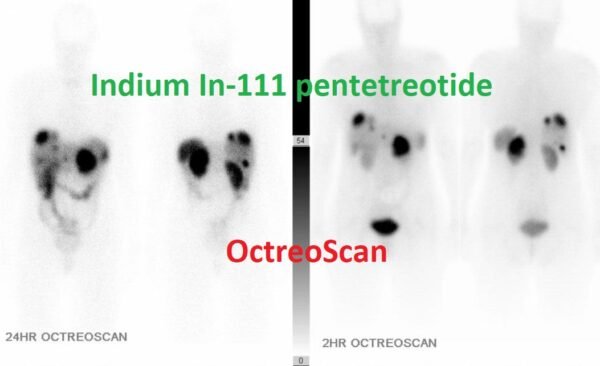A radiolabeled substance called Indium In-111 pentetreotide (OctreoScan) is used to identify and localize cancers, mainly neuroendocrine tumors.
Indium In-111 pentetreotide (OctreoScan) Uses:
-
Neuroendocrine tumor imaging:
- It is used to localize primary and metastatic neuroendocrine tumors with somatostatin receptors using scintigraphy.
Note:
- Imaging agents that target somatostatin receptors tagged with gallium 68, such as gallium ga 68 dotatate, are favored over somatostatin receptor scintigraphy employing indium in-111 pentatreotide due to their higher sensitivity and lower radiation exposure.
Indium In-111 pentetreotide dose in adults:
For imaging of neuroendocrine tumors, indium In-111 pentetreotide (OctreoScan) dose:
-
Planar imaging:
- 3 mCi (111 MBq) intravenously.
-
Single photon emission computed tomography (SPECT) imaging:
- 6 mCi (222 MBq) intravenously.
Indium In-111 pentetreotide dose in children:
Neuroendocrine tumor imaging with indium In-111 pentetreotide (OctreoScan) dose:
- 0.14 mCi/kg (5 MBq/kg) intravenously.
Pregnancy Risk Factor C
- Pregnancy can be dangerous for women who use radiopharmaceutical drugs. You should avoid it or use it only when indicated.
- The drug has not yet been tested in human or animal pregnancy studies.
Indium In-111 pentetreotide use during breastfeeding:
- One patient reported that 0.025% of the administered dose was excreted into breast milk. This would have produced an infant dose equivalent to 82 mrem (0.82mSv) had breastfeeding not been stopped.
Dose in Kidney Disease:
Dosage adjustments have not been provided in the manufacturer’s labeling in patients with kidney disease. However, it should be used with caution.
Dose in Liver disease:
Dosage adjustments have not been provided in the manufacturer’s labeling in patients with liver disease.
Side effects of Indium In-111 pentetreotide (OctreoScan):
- Allergic reactions may occur manifesting as fever, flushing, itching, and dizziness.
- Patients may develop nausea, headache, arthralgia, hypotension, and deranged liver enzymes.
Contraindications to Indium In-111 pentetreotide (OctreoScan):
The manufacturer's label does not contain any contraindications.
Warnings and precautions
-
Regulation of Glucose
- Patients with insulinoma may experience severe hypoglycemia. This medication should be avoided.
- It is important to monitor blood glucose levels before and after administering insulin.
-
Renal impairment
- It should be used with caution by patients with impaired renal function.
Monitoring parameters:
None mentioned.
How to administer Indium In-111 pentetreotide (OctreoScan)?
- It is available for intravenous administration only.
- Before administering the drug, the patient should be well hydrated.
- Hydration should be continued after the administration of the drug as well.
- Patients should be asked to increase fluid intake and void frequently to avoid bladder exposure during the first 24 hours of the drug administration.
- Patients should also be advised of laxatives before the administration of the drug and for 48 hours after receiving the drug.
- Since it is a radiopharmaceutical agent, it should be handled with full precautions and should be disposed of properly.
Mechanism of action of Indium In-111 pentetreotide (OctreoScan):
- Pentetreotide, a human hormone somatostatin analog peptide analog, is labeled using the radiopharmaceutical agent Indium 111.
- It binds to the somatostatin 2 receptors.
- Patients with an increase in insulinoma's signal uptake are likely to have a neuroendocrine tumor.
- This helps to diagnose and locate these tumors.
International Brand Names of Indium In-111 pentetreotide:
- OctreoScan
Indium In-111 pentetreotide Brand Names in Pakistan:
No Brands Available in Pakistan. May be available in specific radio-oncology hospitals.




